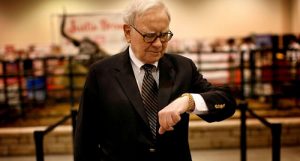Mini-budget: Do the sums add up after Chancellor Kwasi Kwarteng gives only half the story? | Paul Kelso
The Office of Budget Responsibility usually toils in obscurity, the dryness of its name belying the importance of its role in making the national finances add up.
Created by George Osborne in 2010 when he was chancellor, the OBR is, in the jargon, an independent fiscal watchdog.
In practice, it marks the government’s budgetary homework, checking the sums add up to provide reassurance to voters and, crucially, financial markets.
House prices warning as growth slows to single digits – economy latest
It does this in five ways.
It provides forecasts to the Treasury to accompany budgets and spring statements, checks government performance against its fiscal targets (usually aimed at controlling debt) and checks the sustainability of the public finances and tax and welfare policy costings.
Crucially, it is independent.
Mr Osborne said he was creating a rod for his own back and his successors, but that is precisely the point.
Like the Bank of England, the OBR is designed to be an institutional bulwark against the short-term instincts of ministers.
Think of them as a surveyor in the home buying process.
The seller might insist that a crack in the wall is just the paint, but you would be mad to go ahead with the purchase without checking that it’s not subsidence.
Yet this is what the chancellor and prime minister did last week, pressing ahead with a budget in all but name without publishing a forecast from the OBR, a decision that many observers, including the former Bank governor Mark Carney, believe contributed to a rapid loss of credibility.
Kwasi Kwarteng stood up before the country, and an audience of unsentimental international investors, with only half the story.
He set out radical plans to borrow to cut taxes, but with no forecast or OBR health check, we had to take his word that his plans would deliver the growth to pay for it.
Read more:
Bank chief economist rebukes government defence of market turmoil
Adam Boulton on economic crisis
In a damaging revelation, the OBR has confirmed that it provided the first draft of a forecast to Mr Kwarteng on his first day, 6 September, and said it had time to produce a fuller document in time for his announcement, an offer he rejected.
That now looks at best a failed gamble and at worst hubristic and reckless.
Investors were, to put it kindly, unconvinced.
The market response to his announcement was brutal, sending the pound tumbling, interest rate forecasts in the opposite direction and gilt markets into turmoil, necessitating a £65bn intervention from the Bank of England.
To return to the housing analogy, the foundations were wobbly all of a sudden.
After several days of silence, Mr Kwarteng and Liz Truss have now moved to shore up the edifice and restore a little credibility.
Richard Hughes, the OBR chairman, was called to Downing Street for an extremely rare meeting with both of them.
Some have speculated this might be an attempt to browbeat him into producing a favourable forecast later this year.
More likely, however, is that this is a performative moment, a chance for the prime minister and chancellor to signal to markets, voters and restive Conservative MPs that they appreciate the need for independent endorsement of their plans.
Whatever the presentation, the reality is that they do not have much time, or political space, to do anything but lean hard on the OBR now.
Subscribe to the Daily podcast on?Apple Podcasts,? Google Podcasts,? Spotify, Spreaker
Until today the chancellor’s plan was to wait until the announcement of a medium-term fiscal plan on 23 November to publish an OBR forecast.
But leaving the pound and UK debt markets to swing in the wind of investor sentiment for eight weeks is a luxury he no longer has.
On Thursday the OBR made it clear it could have a first draft ready by next week and senior MPs led by Mel Stride, chairman of the Commons Treasury select committee, have called for that to be published.
There are two other crucial dates.
On 12 October the Bank of England is set to end its emergency gilt-buying programme.
It has reserved the right to extend, but letting that cliff-edge approach without doing everything possible to restore market confidence would be, in the language of Yes, Minister, bold.
On 3 November, meanwhile, the Bank’s Monetary Policy Committee meets to consider interest rates.
Last week, they increased rates 0.5 percentage points the day before the chancellor’s statement.
To let them act again, blind to the OBR’s assessment of the implications, would be even bolder.
However, the next few weeks play out there is one central question that choreography will not answer – do the sums add up?
If the OBR’s answer is that the chancellor’s assumptions are wrong it creates a bigger headache, one that might only be addressed by spending cuts.
A good thing perhaps the prime minister has insisted she is prepared to be unpopular.


